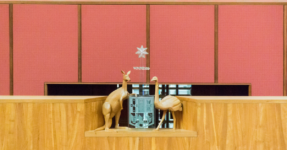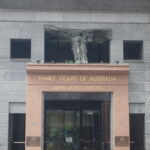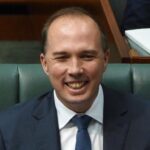The Criminal Offence of Contempt of an Australian Senate Inquiry

Despite having a multi-million dollar payout in his back pocket and a substantial free flights package with Qantas, the Australian Government apparently did not consider former Alan Joyce to be a ‘flight risk’ while organising a Senate Inquiry into Qatar Airlines.
But the former Qantas CEO left Australia and is currently in Europe, saying he will not be returning for the inquiry due to ‘personal commitments’.
Now, Mr Joyce is being threatened with an arrest warrant and potential prison time if he fails to front up to answer questions about the federal government’s decision to block a bid from Qatar Airways to double its flights to major Australian cities.
Storm in a teacup or justified?
Many Australians believe the whole Qatar Inquiry is something that does not justify an expensive, full senate inquiry.
But others feel it is important to provide transparency and get to the bottom of the reasoning behind the decision, including to ensure there has been no corrupt conduct which promotes an anti-competitive environment and potentially denies Australians the choice of airlines – especially given the increase in the prices of plane tickets post-Covid.
The Qatar Airways backstory
Middle-Eastern airline company Qatar Airways, which has just a two percent share of the Australian international flights market, was blocked last year from providing an additional 28 flights a week on an ongoing basis to Melbourne, Sydney, Brisbane and Perth.
The airline asserts it was “surprised” by the Australian Government’s decision and states it has not been given a satisfactory explanation for it.
Now, it has requested a full formal response, which the Government is required to provide by 12 October 2023.
Possible undue influence
There is widespread speculation that lobbying by Qantas influenced the decision to block Qatar Airlines, to the disadvantage of the flying public.
There are also questions around the close relationship between Alan Joyce and the Prime Minister, which has come to light amongst the recent criticism and backlash against Qantas over its shady business practices, treatment of customers, the high price of airfares, claims of “bullying” and slot hoarding which have impacted the industry by hindering a healthy, competitive playing field for all airlines, for the benefit of workers and consumers.
There are also concerns about the way Transport Minister Catherine King handled the process around Qatar’s application to service more routes, as well as the way in which she communicated the decision.
Strip searches of Australian women ‘not the reason’
Some weeks ago, Ms King intimated to the media that an incident whereby a number of Australian women were subjected to invasive strip searches at Doha airport in 2020 was a significant consideration.
However, the deputy secretary for Transport, Marisa Purvis-Smith, has since told the Senate inquiry it was not a factor in the decision to block the flights.
The Senate Inquiry is being run by Bridget McKenzie who has now officially gone on record saying that Alan Joyce has been requested to attend because he “is the only one that can go to conversations that he’s informally had with his bromance partner, the prime minister, Anthony Albanese and indeed Minister King”.
Alan Joyce left Qantas amid a whole lot of controversy last month – in his final days drawing considerable frustration from the Select Committee trying to get straight answers out of him during the “cost of living” inquiry.
Joyce threatened with prospect of imprisonment
Mr Joyce has always been one to talk in riddles.
He is a master at side-stepping even the most pointed questions, so Briget McKenzie’s Senate Committee definitely has its work cut out for it, and a looming deadline to respond to Qatar Airlines.
However, Bridget McKenzie has publicly warned Mr Joyce that there are a “whole raft of processes” the Inquiry can invoke if he fails to return.
Ms McKenzie went so far as to mention a precedent set in the 1950s when two journalists were imprisoned for not adhering to a summons order, although she added “let’s hope we don’t get there”.
Mr Joyce told the inquiry that he could not attend either in person or via video link due to personal commitments.
New Qantas Chief, Vanessa Hudson has already fronted the Inquiry, but Mr Joyce is believed to have additional key information.
The powers of a Senate Inquiry
Section 49 of the Australian constitution gives each House of Parliament the powers of the United Kingdom’s House of Commons as at 1901, which includes the power to compel evidence.
Pursuant to the section, the Senate has a general power, not subject to any known legal limitations, to compel evidence; in other words, to require the attendance of witnesses, to compel the answering of questions and the production of documents, and to impose penalties for contempt, including prison sentences.
And although the Senate does not have the power to compel other Ministers to attend, they can, and sometimes do, require ministerial staff to attend on their behalf instead.
Most people attend Senate Inquiries without issue – after all, such inquiries are an important part of the democratic process.
The responsibilities of witnesses
The legal responsibilities of those summonsed by a Senate Inquiry include:
- To attend the Senate committee hearing,
- To refrain from releasing written submissions regarding the matter unless the committee has authorised its publication,
- To give full, frank and honest evidence before the committee, and thereby refrain from making false or misleading statements,
- To produce relevant documents if ordered to do so, and
- To be prepared to fully justify any legal objections to answering questions or providing materials.
The rights of and protections for witnesses
The legal rights of those summonsed by a Senate Inquiry are protected by the Parliamentary Privileges Act 1987.
The Act prevents the use of the evidence, whether oral or in documentary or other form, from being used against the witness in proceedings before another court or tribunal, except for proceedings which relating to the criminal offence of perjury or contempt for conduct pursuant to the summons.
There are also a number of procedural protections afforded to witnesses, which include being:
- Given reasonable notice of the Senate committee hearing,
- Supplied with the committee’s terms of reference for the hearing and, where appropriate, a transcript of relevant evidence already given,
- Able to provide the committee with written submissions before attending the hearing to give oral evidence (those submissions cannot be otherwise published without the committee’s permission),
- Only required to answer questions that are relevant to the committee’s inquiry,
- Able to apply to be accompanied by a legal representative to the committee hearing,
- Able to object to answering questions on grounds that include self-incrimination and invasion of privacy (although the committee may nevertheless compel answers),
- Able to give evidence in private session or make confidential submissions to the committee (although the committee may subsequently publish that evidence or those submissions),
- Given a reasonable opportunity to write and/or appear before the committee to respond to evidence that adversely reflects on him or her, and
- Given a reasonable opportunity to correct any errors in the transcript of the committee hearing and/or to submit additional evidence.
The criminal offence of contempt of the Australian Senate
Obstructing the inquiries of a Senate Committee constitutes the criminal offence of contempt of the Senate.
Examples of such conduct include:
- Failing to attend or to produce documents when required to do so;
- Refusing without reasonable excuse to answer a question;
- Giving false or misleading evidence;
- Intimidating a witness;
- Treating a witness adversely; and
- Wilfully disturbing a committee while it is meeting.
The penalties that apply are not legislated and are ‘at large’, which means a broad range of penalties including prison time can be imposed.
There is no maximum prison sentence, although criminal justice principles dictate that a sentence cannot be disproportionate to the offending conduct.
The Qantas saga continues
In September, the ACCC filed legal action against Qantas alleging it engaged in ‘false misleading or deceptive conduct’ when it advertised tickets for flights it had actually cancelled.
Around the same time, the High Court found that Qantas illegally terminated the positions of 1700 workers during the pandemic, when it outsourced its ground staff.
New CEO Vanessa Hudson has vowed to move swiftly to compensate workers, which will reportedly cost the airline about $200 million.








